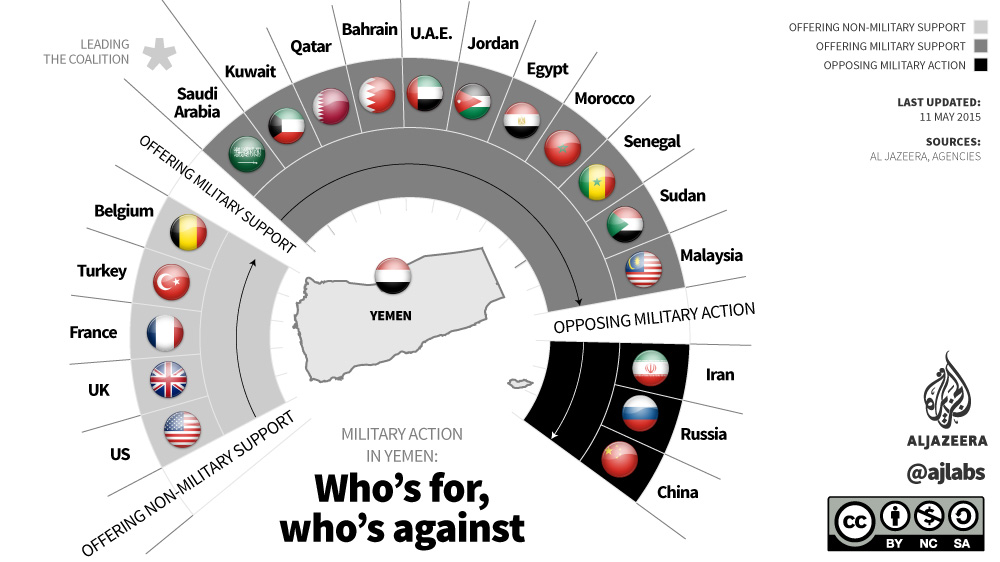Summit comes as US rules out military pact with six Gulf nations, part of a military coalition fighting Yemeni rebels.
US President Barack
Obama will seek to convince his Gulf allies that Washington is
committed to their security despite deep concern among Arab leaders
about US efforts to broker a nuclear deal with Iran.
During a rare, high-profile summit at the Camp David presidential retreat in Maryland on Thursday, Obama will meet with representatives from Saudi Arabia, Kuwait, Qatar, Bahrain, the United Arab Emirates and Oman, all members of the Gulf Cooperation Council, to discuss security cooperation.
Tension over US policy towards Tehran, Syria and the Arab Spring uprisings will loom over the meetings, which have already been overshadowed by some countries' decisions to send lower-level leaders.
Saudi King Salman pulled out, sending Crown Prince Mohammed bin Nayef and Deputy Crown Prince Mohammed bin Salman instead.
The meeting comes a day after the US ruled out a military pact with the Arab Gulf states, citing the complexities of forming a treaty in the Middle East.
Ben Rhodes, the US deputy national security adviser for strategic communication, told Al Jazeera's Patty Culhane on Wednesday the US was committed to the defence of Gulf Cooperation Council (GCC) countries but a formal treaty would not happen in the near future.
"A treaty is not what we're looking for. It took decades to build NATO and the Asian allies but we can provide clear assurances that we will come to their defence," Rhodes said, alluding to a prospective alliance with the Gulf countries.
US Secretary of State John Kerry said on the same day that NATO member states wanted to see a clearer defence agreement with Gulf Arab states.
"I think all of the member states feel very strongly that defining a ... clearer defence arrangement between the GCC and other friendly countries and the United States is going to be critical to helping them push back against terrorism," he said at a meeting of NATO foreign ministers in Turkey.
Saudi-led coalition
An Arab military coalition led by Saudi Arabia has been conducting air strikes in Yemen to halt a Houthi offensive and restore the government of exiled President Abd-Rabbu Mansour Hadi.
Both Saudi Arabia, where Hadi sought refuge, and Qatar also back Syrian fighters battling to overthrow the Iranian-backed Syrian government.
The Gulf countries are expected to press the US for a written commitment to defend them in case of an Iranian attack.
In a related development, Iran announced on Wednesday that it was sending an aid ship to Yemen, prompting a fresh war of words with the US.
Iranian Brigadier-General Masoud Jazayeri warned the US against stopping the ship, after the US said it was tracking its movements.
Jazayeri said that if Saudi Arabia or the US "continue to create obstacles on Iran's aid delivery, a fire might start that would definitely be out of their control".
During a rare, high-profile summit at the Camp David presidential retreat in Maryland on Thursday, Obama will meet with representatives from Saudi Arabia, Kuwait, Qatar, Bahrain, the United Arab Emirates and Oman, all members of the Gulf Cooperation Council, to discuss security cooperation.
Tension over US policy towards Tehran, Syria and the Arab Spring uprisings will loom over the meetings, which have already been overshadowed by some countries' decisions to send lower-level leaders.
Saudi King Salman pulled out, sending Crown Prince Mohammed bin Nayef and Deputy Crown Prince Mohammed bin Salman instead.
The meeting comes a day after the US ruled out a military pact with the Arab Gulf states, citing the complexities of forming a treaty in the Middle East.
Ben Rhodes, the US deputy national security adviser for strategic communication, told Al Jazeera's Patty Culhane on Wednesday the US was committed to the defence of Gulf Cooperation Council (GCC) countries but a formal treaty would not happen in the near future.
"A treaty is not what we're looking for. It took decades to build NATO and the Asian allies but we can provide clear assurances that we will come to their defence," Rhodes said, alluding to a prospective alliance with the Gulf countries.
US Secretary of State John Kerry said on the same day that NATO member states wanted to see a clearer defence agreement with Gulf Arab states.
"I think all of the member states feel very strongly that defining a ... clearer defence arrangement between the GCC and other friendly countries and the United States is going to be critical to helping them push back against terrorism," he said at a meeting of NATO foreign ministers in Turkey.
Saudi-led coalition
An Arab military coalition led by Saudi Arabia has been conducting air strikes in Yemen to halt a Houthi offensive and restore the government of exiled President Abd-Rabbu Mansour Hadi.
Both Saudi Arabia, where Hadi sought refuge, and Qatar also back Syrian fighters battling to overthrow the Iranian-backed Syrian government.
The Gulf countries are expected to press the US for a written commitment to defend them in case of an Iranian attack.
In a related development, Iran announced on Wednesday that it was sending an aid ship to Yemen, prompting a fresh war of words with the US.
Iranian Brigadier-General Masoud Jazayeri warned the US against stopping the ship, after the US said it was tracking its movements.
Jazayeri said that if Saudi Arabia or the US "continue to create obstacles on Iran's aid delivery, a fire might start that would definitely be out of their control".
 |
Source: Al Jazeera
No comments:
Post a Comment